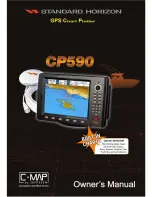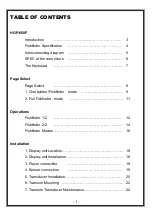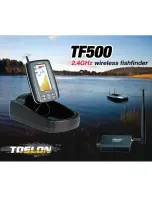
58
There is a common exception to these rules of thumb. Some fishermen
on freshwater lakes (or the ocean) using downriggers like to see them
on the sonar. In many of those cases, you'll see a 50 kHz transducer
frequency in use because the wider cone angle lets them watch the bait.
Sonar Features menu with a frequency of 200 kHz selected.
To change the frequency setting to 200 kHz:
1. From the Sonar Page, press
MENU
|
↓
to
S
ONAR
F
EATURES
|
ENT
|
ENT
.
2. Press
EXIT
|
EXIT
to clear the menu.
To change the frequency setting to 50 kHz:
1. From the Sonar Page, press
MENU
|
↓
to
S
ONAR
F
EATURES
|
ENT
.
2. Press
↓
to
50
K
H
Z
|
ENT
|.
3. Press
EXIT
|
EXIT
to clear the menu.
Grayline
Grayline lets you distinguish between strong and weak
echoes. It "paints" gray on targets that are stronger than a
preset value. This allows you to tell the difference between
a hard and soft bottom. For example, a soft, muddy or
weedy bottom returns a weaker signal which is shown with
a narrow or no gray line. A hard bottom returns a strong
signal which causes a wide gray line.
If you have two signals of equal size, one with gray and the
other without, then the target with gray is the stronger signal. This
helps distinguish weeds from trees on the bottom, or fish from structure.


































